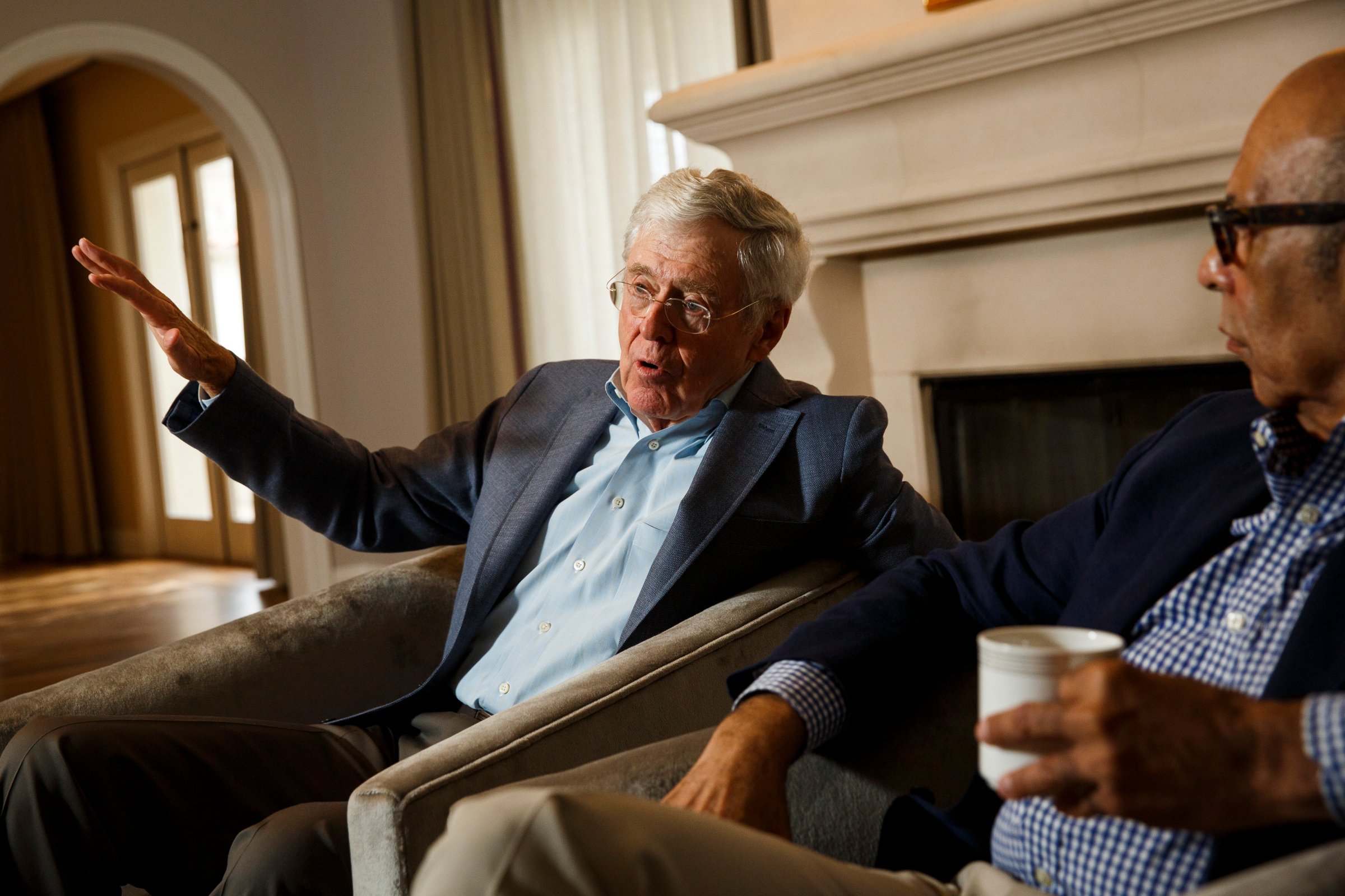
The influential network of policy and political groups backed by billionaires Charles and David Koch plan to grow tenfold in coming years, Charles Koch said Saturday as he welcomed 550 of his likeminded pals assembled in California for a donor summit.
All told, the eye on policy and politics will be as much as $400 million, their biggest bucket for a midterm cycle in the groups’ histories. That is on top of cash the influential brothers and their allies funnel every year to projects working in schools, prisons and non-profit groups.
“The capabilities that we have now can take us to a whole new level. So my challenge to all of this is to increase the scale and effectiveness of this network by an order of magnitude, by another tenfold on top of all the growth and progress we’ve already made,” the the sixth-richest man in the world, with an estimated worth of $52 billion, said. “If we can do that, I’m convinced we can change the trajectory of this country.”
Already one of the dominant players in conservative and libertarian circles, the Koch-backed network stands ready to expand well beyond its well-oiled political machinery that has shown tremendous success electing like-minded candidates. The network last week announced plans to pilot a program in prisons in four states to help inmates write exit plans, is expanding its Dallas-based anti-violence programs to Baton Rouge and is looking to double its spending on education for elementary and high school students.
“We’re just getting started,” said Brian Hooks, one of the top officials with the Koch organizations and the chief of the Charles Koch Foundation.
The network’s broad work — a “grab bag of activities” in the self-deprecating words of Hooks — may seem scattershot from the outside. For instance, how do you combine tea party-styled groups, a $100 million annual allocation for students and scholars at 350 universities and an ambitious overhaul of the criminal justice system? The overriding mission, officials say, is to open doors for Americans. In the coming years, that will include anti-poverty programs, anti-gang efforts and more investments in non-profit groups.
“I’m more excited about what we’re doing and about the opportunities than I’ve ever been,” Charles Koch said. “We’ve made more progress in the last five years than I had in the previous 50.”
But the biggest public-facing impact is through the political work, channeled through groups like the grassroots-focused Americans for Prosperity. The Koch groups spent $20 million to help pass the Republican tax cuts and are preparing to spend that much again to improve its popularity ahead of the 2018 elections and to match public opinion to the strengthening economic indicators.
In that, there were no illusions that the political cycle would be gentle on the Kochs and their favored candidates. Time and again at a briefing with reporters, officials reminded reporters that history predicts the party in the White House loses seats in Congress during their first midterm elections. It was an effort at lowering expectations.
“We know the challenges out there at the state and federal level,” said Tim Phillips, president of Americans for Prosperity. “We’re all in trying to protect those in what will be a challenging year.” To that end, the politics and policy budget is a 60% boost over what the group spent in 2016, when the prospect of President Donald Trump leading the Republican ticket left many donors sour on the race and most sat it out.
Democrats would need to net 24 seats in the House to claim the majority. The enthusiasm among Democrats — and new activists boosting them — has caused plenty of heartburn for Republicans. GOP candidates will clearly be on defense this year, but the Koch-backed groups say they will not provide unconditional support. “We’re not the Republican National Committee,” said James Davis, an executive vice president with the network. “We’re not toeing a party line. We’re going to support principled leaders.”
The Kochs convene these summits twice a year, usually at resorts that are heavily secured and exclusive to donors who pony up at least $100,000. Reporters are invited to attend some sessions if they agree not to identify donors who wish their patronage to remain private. A slate of elected officials are expected to attend, including the No. 2 Republican in the Senate, John Cornyn, and the leader of the conservative Freedom Caucus, Mark Meadows.
(Disclosure: Time Inc., TIME’s parent company, has agreed to be acquired by Meredith Corp. in a deal partially financed by Koch Equity Development, a subsidiary of Koch Industries Inc.)
More Must-Reads from TIME
- Why Trump’s Message Worked on Latino Men
- What Trump’s Win Could Mean for Housing
- The 100 Must-Read Books of 2024
- Sleep Doctors Share the 1 Tip That’s Changed Their Lives
- Column: Let’s Bring Back Romance
- What It’s Like to Have Long COVID As a Kid
- FX’s Say Nothing Is the Must-Watch Political Thriller of 2024
- Merle Bombardieri Is Helping People Make the Baby Decision
Write to Philip Elliott / Indian Wells, Calif. at philip.elliott@time.com